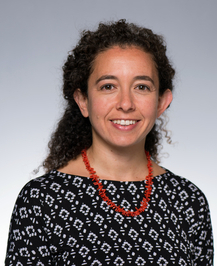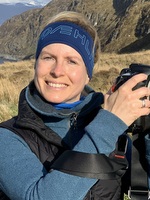Benjamin Martin – University of Amsterdam Benjamin Martin is an Assistant Professor in the Department of Theoretical and Computational Ecology at the University of Amsterdam. Benjamin uses theory and data-driven approaches to identify the rules that govern how animals interact with each other and their environments and the consequences of these rules for ecological dynamics.
Benjamin Martin is an Assistant Professor in the Department of Theoretical and Computational Ecology at the University of Amsterdam. Benjamin uses theory and data-driven approaches to identify the rules that govern how animals interact with each other and their environments and the consequences of these rules for ecological dynamics.
Mechanistic modeling of thermal stress for improved conservation and ecological theory
Predicting how species will respond to a warming planet is a fundamental goal of applied ecology. Nevertheless, context dependency – an intrinsic characteristic of biological systems – frequently complicates these predictions. For instance, while thermal tolerance is often treated as a fixed species trait, it shows remarkable variability across individuals, life stages, and environments. Focusing on aquatic embryos as a model system, I show how mechanistic models can be used to unravel this complexity, revealing how complex,context-dependent patterns of thermal tolerance can emerge from a simple mechanism of oxygen supply and demand. Finally, I show how this mechanistic insight is both guiding the management of endangered fish populations as well as generating insights into how biophysical constraints shape aquatic life histories.
David Storch – Charles University, Prague David Storch is a professor at the Department of ecology, Faculty of Science, and the Center for Theoretical Study, Charles University in Prague. Trained as a field ornithologist, he subsequently moved into more theoretical ecological disciplines, namely macroecology and biodiversity research, even though he still does some field work (mainly in Africa). He is interested in bioidiversity patterns in space and time, and recently he is working on a general equilibrium theory of biodiversity dynamics. He is associate editor of Ecology Letters and Global Ecology and Biogeography, and the president of Czech Society for Ecology.
David Storch is a professor at the Department of ecology, Faculty of Science, and the Center for Theoretical Study, Charles University in Prague. Trained as a field ornithologist, he subsequently moved into more theoretical ecological disciplines, namely macroecology and biodiversity research, even though he still does some field work (mainly in Africa). He is interested in bioidiversity patterns in space and time, and recently he is working on a general equilibrium theory of biodiversity dynamics. He is associate editor of Ecology Letters and Global Ecology and Biogeography, and the president of Czech Society for Ecology.
Towards a general framework for understanding biodiversity patterns in space and time
During the last few decades, we have learnt a lot about biodiversity patterns across scales, space, and time. Yet, there is no consensus about the origin of these phenomena. To test and resolve dozens of hypotheses which have been proposed so far, we need a robust theoretical framework. I will present such a framework, called the Equilibrium Theory of Biodiversity Dynamics (ETBD). It postulates that diversity dynamics is universally driven by the balance of population-size dependent species origination and extinction modulated by total amount of resources (energy availability). In cotrast to previous approaches, ETBD assumes that community abundance is not an independent input but is itself dependent on biodiversity, so that the dynamics comprises complex interactions between diversity and abundance patterns. The theory predicts an existence of regional and local biodiversity equilibria, determined by total amount of resources (energy availability), factors affecting origination and extinction rates, and a feedback between community abundance and species richness. Due to this complex feedback, multiple equilibria and tipping points may emerge in diversity dynamics. According to the ETBD, diversity equilibria may shift due to three principally different reasons: (1) change of the total resource levels, (2) change of the factors that directly affect species origination or extinction rates, e.g. the existence of geographic barriers or the temporal stability of the environment, (3) change of the function that links species richness to community abundance via the effect of diversity on ecosystem functioning and resource acquisition. The theory illuminates the origin of major macroecological patterns including the latitudinal diversity gradient, patterns in phylogenies and fossil time series, and non-trivial scaling relationships between energy availability, community abundance and species richness. It has profound consequences for understanding current human-induced biodiversity changes.
Maja Schlüter – Stockholm Resilience Centre, Stockholm University Maja Schlüter is Professor of Social-ecological Systems Research at the Stockholm Resilience Centre, Stockholm University. Together with the seslink team (seslink.org) she studies the social-ecological processes that give rise to regime shifts, adaptation or transformation, such as the collapse of the Baltic Cod, restoration of a turbid lake or responses of Mexican fisheries to environmental change. In her work, she combines in-depth field studies with agent-based modelling to identify causal mechanisms of change, better understand social-ecological interdependence and the multi-level and dynamic nature of social-ecological systems. Her research has been funded by two ERC grants for the development of middle-range theory and an interdisciplinary research environment to study causation in social-ecological systems.
Maja Schlüter is Professor of Social-ecological Systems Research at the Stockholm Resilience Centre, Stockholm University. Together with the seslink team (seslink.org) she studies the social-ecological processes that give rise to regime shifts, adaptation or transformation, such as the collapse of the Baltic Cod, restoration of a turbid lake or responses of Mexican fisheries to environmental change. In her work, she combines in-depth field studies with agent-based modelling to identify causal mechanisms of change, better understand social-ecological interdependence and the multi-level and dynamic nature of social-ecological systems. Her research has been funded by two ERC grants for the development of middle-range theory and an interdisciplinary research environment to study causation in social-ecological systems.
Modelling human-environment interactions for uncovering mechanisms of change in social-ecological systems
Understanding and governing unintentional and intentional change such as ecological regime shifts or societal transformations is a key challenge for sustainable development. Such change emerges from complex interactions between people, societies and ecological processes across multiple scales. Modelling offers unique opportunities for studying such social-ecological dynamics, however, making assumptions about relations between the diverse human and non-human elements of a social-ecological system is difficult and data are limited. In this talk, I will present an approach to modelling social-ecological phenomena for theorizing processes of change that builds on close collaborations with qualitative empirical research and uses the resulting model to study causal mechanisms of change. I will illustrate the approach through examples from restoring a degraded lake ecosystem in Sweden, European fisheries management, agricultural innovation in sub-Saharan Africa, and poverty traps. The studies highlight the importance of social-ecological interactions and contexts, the type and timing of feedbacks, time lags and path-dependencies for shaping systemic outcomes.
Sara Mitri – University of Lausanne Sara Mitri is Assistant Professor, working in microbiology at the University of Lausanne. She leads a group that studies ecosystems of microbes, in particular how different species of microbes interact and how these interactions evolve over time. Having started her career in computer science, however, she has worked in many different areas of science, including the evolution of deception in robots. Perhaps because of her diverse background, she strongly believes in combining different research methodologies in her work, including mathematical modeling, computer simulations and laboratory experiments.
Sara Mitri is Assistant Professor, working in microbiology at the University of Lausanne. She leads a group that studies ecosystems of microbes, in particular how different species of microbes interact and how these interactions evolve over time. Having started her career in computer science, however, she has worked in many different areas of science, including the evolution of deception in robots. Perhaps because of her diverse background, she strongly believes in combining different research methodologies in her work, including mathematical modeling, computer simulations and laboratory experiments.
Predicting and controlling the ecological dynamics of small bacterial communities
Microbial communities can be incredibly useful, if only we could control them and predict their dynamics. But since studying eco-evolutionary dynamics in natural systems is extremely challenging, in my lab we use small bacterial communities as model systems. I will present experiments and theory using such a small community, which suggest that bacterial species often engage in a mixture of positive and negative interactions whose balance depends on how stressful their current environment is. This understanding has led us to develop a mathematical framework, which can predict how different species will organise in time, in space and whether they will coexist in the long term. Being able to predict and control community dynamics via the environment may give us the tools to manipulate microbial communities to our advantage, with many potential applications.
Stephanie Kramer-Schadt – Leibniz Institute for Zoo and Wildlife Research, Berlin Stephanie Kramer-Schadt is Professor for Applied Animal Ecology at TU Berlin and leads the Department of Ecological Dynamics at the Leibniz-Institute for Zoo- and Wildlife Research. Her interest lies in combining field work, data-driven and predictive approaches for wildlife conservation and management in the Anthropocene. She uses spatially-explicit, individual-based models to assess population dynamics and connectivity, including disease spread, with the ultimate aim to assess the viability of wildlife populations under environmental change.
Stephanie Kramer-Schadt is Professor for Applied Animal Ecology at TU Berlin and leads the Department of Ecological Dynamics at the Leibniz-Institute for Zoo- and Wildlife Research. Her interest lies in combining field work, data-driven and predictive approaches for wildlife conservation and management in the Anthropocene. She uses spatially-explicit, individual-based models to assess population dynamics and connectivity, including disease spread, with the ultimate aim to assess the viability of wildlife populations under environmental change.
The host, the environment and the pathogen – understanding wildlife disease dynamics when data are rare
Management of wildlife diseases requires a thorough understanding of the many factors that influence disease dynamics. Factors intrinsic to the host, such as the social system or movement in space, affected by resource heterogeneity, shape the contact networks between individuals. The resulting structure of these networks can critically influence pathogen transmission and disease dynamics over large spatio-temporal scales. For example, rare events such as long-distance movements, feedbacks between infection and movement capacity, or spatial clustering are likely to affect the persistence of pathogens. However, data and knowledge on basic wildlife parameters such as density, contact rates and susceptibility to infection are difficult to obtain and scarce. For rigorous hypothesis testing of host effects on disease outbreaks, we used statistical models of long-term outbreak data and agent-based models of mammalian social host species. We linked life history traits, movement strategies and their feedbacks in seasonally changing landscapes to disease dynamics. We found that movement and social traits can reverse theoretical findings of epidemic fade-out, obtained with mathematical mean-field models. This is due to rescue effects in heterogeneous and seasonal environments which are not captured by simpler models. In the context of global change, our findings provide important insights into the dynamics of disease outbreaks in wildlife. The additional effort for considering detailed and more realistic representations of host processes in their spatio-temporal context thus pays off well when it comes to transforming current management practices.
Otso Ovaskainen – University of Jyväskylä Otso Ovaskainen is Academy Professor at University of Jyväskylä (Finland), also Research Director at University of Helsinki (Finland) and a Visiting Professor at NTNU Trondheim (Norway). Together with Dr. Nerea Abrego, he leads the Predictive Community Ecology research group consisting of ca. 30 researchers. Prof. Ovaskainen is especially interested about the interface between empirical and theoretical ecology. He develops methods in statistical ecology, mathematical ecology and bioinformatics, and applies these methods to learn about community ecology, spatial ecology, movement ecology, population genetics and evolutionary biology. In statistical ecology, his main research line is joint species distribution modelling, especially hierarchical modelling of species communities (HMSC). In mathematical ecology, his main research line is agent-based modelling, including both the development of mathematical methods as well as the use of models to advance theory. In bioinformatics, his main research line is automated methods for species identification from DNA, audio and image data.
Otso Ovaskainen is Academy Professor at University of Jyväskylä (Finland), also Research Director at University of Helsinki (Finland) and a Visiting Professor at NTNU Trondheim (Norway). Together with Dr. Nerea Abrego, he leads the Predictive Community Ecology research group consisting of ca. 30 researchers. Prof. Ovaskainen is especially interested about the interface between empirical and theoretical ecology. He develops methods in statistical ecology, mathematical ecology and bioinformatics, and applies these methods to learn about community ecology, spatial ecology, movement ecology, population genetics and evolutionary biology. In statistical ecology, his main research line is joint species distribution modelling, especially hierarchical modelling of species communities (HMSC). In mathematical ecology, his main research line is agent-based modelling, including both the development of mathematical methods as well as the use of models to advance theory. In bioinformatics, his main research line is automated methods for species identification from DNA, audio and image data.
New high-throughput methods for collecting ecological data pose new challenges for ecological modelling
Traditional methods of detecting species are being increasingly replaced by semi-automated high-throughput methods based on DNA barcoding, camera-traps, bioacoustics monitoring, and other such methods. This has created unprecedented potential for advancing our understanding of nature, but at the same time provides two new kinds of major challenges for data processing and interpretation for two reasons. First, there is the need for converting the information collected by automated samplers to the basic currency of biodiversity analysis: species-level occurrence and/or abundance. Second, current statistical techniques are inherently unsuitable for application to massive scales, both in terms of their underlying assumptions and in terms of their computational performance. I present pilot results of empirical projects that sample global biodiversity with newly emerging high-throughput methods, focusing especially on the challenges and opportunities that such data present for ecological modelling. In this context, I also discuss the long-term challenge of how to infer underlying processes from ecological data. To clarify this, I use agent-based models and virtual ecologists to examine the extent to which ecological processes can be inferred from different types of data.
Valery Forbes – Florida Atlantic University, Boca Raton Valery E. Forbes is Professor in the Department of Biological Sciences and Dean of the Charles E. Schmidt College of Science at Florida Atlantic University (since August 2022). Previously, she served as Dean of the College of Biological Sciences at University of Minnesota (2015-2022), Director of the School of Biological Sciences at University of Nebraska-Lincoln (2011-2015), and Founding Head of the Department of Environmental, Social and Spatial Change at Roskilde University, Denmark (2006-2011). Dr. Forbes received her Ph.D. in Coastal Oceanography from Stony Brook University. Specific research topics include population ecology and modeling, fate and effects of toxic chemicals in sediments, and ecological risk assessment. Dr. Forbes has served on the Danish Natural Sciences Research Council, the European Research Council, NATO’s Environmental Security Panel, and as ad hoc reviewer for numerous funding agencies from various countries. She is on the editorial board of several international journals and provides scientific advice to the private and public sectors. In 2018 she was awarded a prestigious Helmholtz International Fellowship.
Valery E. Forbes is Professor in the Department of Biological Sciences and Dean of the Charles E. Schmidt College of Science at Florida Atlantic University (since August 2022). Previously, she served as Dean of the College of Biological Sciences at University of Minnesota (2015-2022), Director of the School of Biological Sciences at University of Nebraska-Lincoln (2011-2015), and Founding Head of the Department of Environmental, Social and Spatial Change at Roskilde University, Denmark (2006-2011). Dr. Forbes received her Ph.D. in Coastal Oceanography from Stony Brook University. Specific research topics include population ecology and modeling, fate and effects of toxic chemicals in sediments, and ecological risk assessment. Dr. Forbes has served on the Danish Natural Sciences Research Council, the European Research Council, NATO’s Environmental Security Panel, and as ad hoc reviewer for numerous funding agencies from various countries. She is on the editorial board of several international journals and provides scientific advice to the private and public sectors. In 2018 she was awarded a prestigious Helmholtz International Fellowship.
Improving transparency and reproducibility in ecological modeling for decision support: Lessons from ecological risk assessment.
Ecological models can be powerful tools to inform environmental decision-making by linking empirical data to environmental protection goals. For example, when assessing the risks of pesticides and other chemicals to ecological systems, we generally have laboratory toxicity data for a handful of species, whereas our goal is to ensure the persistence of populations of many species in the field. Population models can help link individual-level toxicity data to likely impacts on population dynamics and increase the ecological realism of risk assessments. Despite a long history of use in fisheries and conservation biology, population models have had limited use in ecological risk assessment. In this talk, I will discuss the advantages of using population models to inform ecological risk assessment and management decisions, the challenges in getting them more widely accepted, and the ways that these challenges are being overcome. Improvements in guidance for model development, documentation, and evaluation are increasing the transparency and reproducibility of models, which is (slowly but surely) leading to more widespread acceptance of the models by decision-makers.